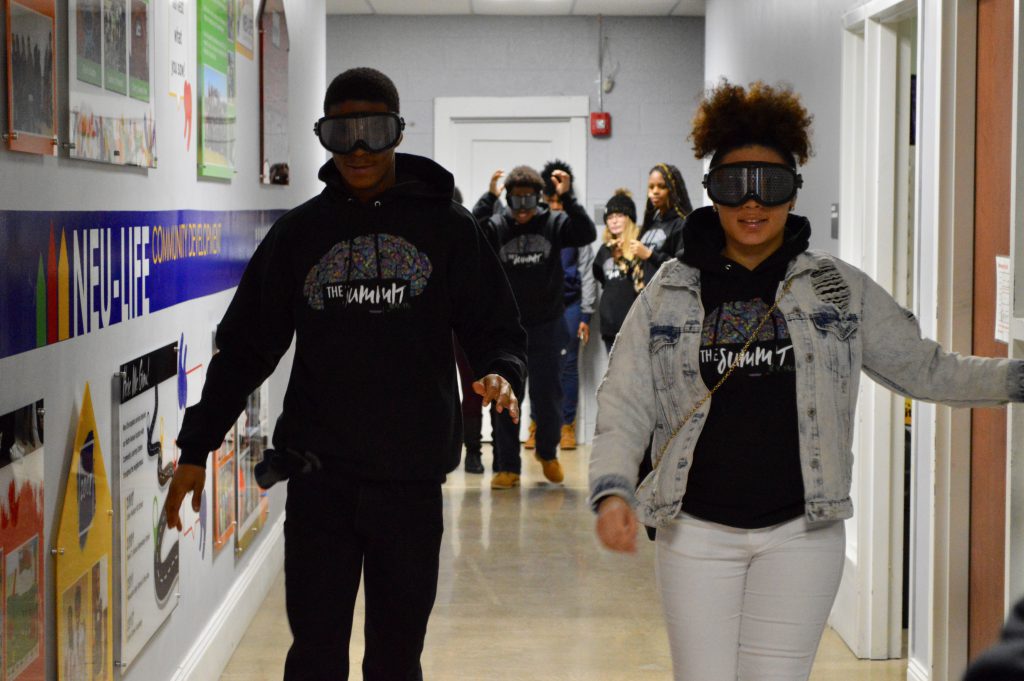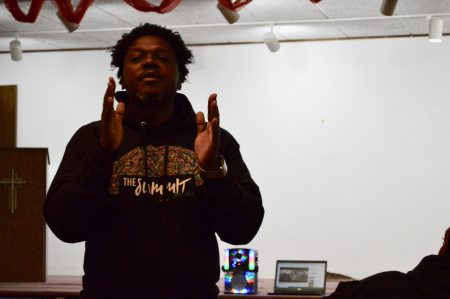Youth Summit Tackles Drugs, Violence
Milwaukee County Substance Abuse Prevention Youth Summit offers young people alternatives.

Two students attempt to walk down the hallway wearing “impairment goggles” that blurred their vision in a way that a person impaired by drugs would experience. Photo by Analise Pruni/NNS.
It was a simple request.
Raise your hands if you’ve ever lost a friend or family member to violence.
Hands across the room shot up.
Though it was a day dedicated to discussing drugs, other weighty issues were tackled during the third annual Milwaukee County Substance Abuse Prevention Youth Summit. The event drew nearly 100 youths and several community leaders earlier this month to the Neu-Life Community Development, 2014 W. North Ave.
This year’s summit included five workshops aimed at giving youths alternatives to doing drugs, namely marijuana.
Destiny Yarbrough, an assistant teacher at the center, lead a workshop on “Being marijuana free.”
“The main goal of the workshop is to inform the youth about the dangers of marijuana, because marijuana is really popular with the youth right now,” Yarbrough said. “We’re just trying to let them know, marijuana is not good, it’s not safe, and it’s really harmful.”
Several organizations, including the United Community Center, Drug-Free Communities and Safe and Sound, ran workshops that showed fun and engaging alternatives to drugs. One workshop demonstrated simple ways to make healthy foods and another gave the kids a crash course in karate.

Keynote speaker Kwabena Antoine Nixon tells young people to do their best. “The worst of the worst they show of us is always going viral,” he says, adding “there’s nothing more empowering than changing your story.” Photo by Analise Pruni/NNS.
Other students donned “impairment goggles” that blurred their vision in a way that a person impaired by drugs would experience and attempted to walk a straight line down the hallway. They zigzagged into the walls and each other with their hands out like drunken zombies.
Jody Rhodes, chair of the summit’s Marijuana Work Group, said this year’s marijuana-centered theme has to do with the recent local and national news coverage discussing general policy changes, including making the drug legal.
“I think it’s more because it’s in the media, talking legalization, and that it’s all natural and that’s just not true for kids,” Rhodes said. “No matter what happens with legalization, marijuana will never be good for kids’ brain at all; their brains are still developing until they’re age 24.”
Kwabena Antoine Nixon, a poet, author and opening speaker, walked around the room and asked everyone to tag their selfies on Snapchat, Instagram and other social media with the hashtag #iseeyou in a show of solidarity.
“The worst of the worst they show of us is always going viral,” Nixon said. “They always talking about a young man being shot; they always talking about a young girl being abused; they always talking about how bad the 53206 and all these neighborhoods are.”
Nixon told the group that the most powerful thing a young person has is his or her mind, and that reading, writing and “programming” were the keys against fighting ignorance.
“That’s why music is called programming.” Nixon said. “If I keep playing something over and over again and I say ‘death is around the corner,’ and you play it five times a day, 20 times a day; what’re you going to think? Death is around the corner.”
He said that first, you’ve got to have a vision for your life.
“There are people who vote on prisons, and they’re building one upstate,” Nixon said. “So if you don’t know where you’re going, there’s somebody somewhere else that knows where you’re going, and they’re waiting for you.”
Second, pay close attention to your circle.
“They say show me your five friends, and I’ll show you where you’ll be in five years,” he said.
Third, change your story.
“There’s nothing more empowering than changing your story,” he added. He told the group to repeat after him. “My destiny is not to die on the block. My destiny is to control this world. It belongs to me! And I will not die young.”
This story was originally published by Milwaukee Neighborhood News Service, where you can find other stories reporting on eighteen city neighborhoods in Milwaukee.


















